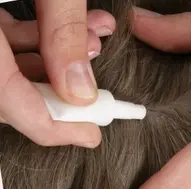Spot-on flea treatment for cats
There are many flea treatment options available, including collars, tablets and spot-ons. To decide which is best for you and your cat, look at the benefits of each and remember, you can always ask your vet or local pet retail store for their recommendations.
How do spot on flea treatments work on cats?

Spot-ons work by applying a small amount of liquid solution to the skin at the base of your cat's head, where they can't lick it off. This solution absorbs into their skin and oil glands and spreads throughout their fur to provide complete cover.
Certain spot-on products will stay exclusively on the outside of the body, whereas some have active ingredients that will be absorbed internally via the skin.
Why choose a spot on flea treatment for your cat?
There are lots of great reasons to use spot-on flea treatments for cats, including:
1. Easy to apply
Spot on flea treatments are super easy to apply. Watch this video on how to apply Advantage Spot On flea treatment for cats:
2. Long-lasting protection and preventative action
Spot-ons can be used to prevent fleas and different products provide varying lengths of protection. As well as killing adult fleas on cats, Advantage Spot On prevents further infestation for 4 weeks - and can be used on kittens from 8 weeks old.
3. Target the source

Kills fleas within 24 hours and prevents further infestations for 4 weeks

Kills fleas through contact, fleas do not need to bite to be killed1
By killing adult fleas present on the cat before they lay eggs, you can prevent a full-blown infestation in your home or avoid worsening an existing one, as you are breaking the flea lifecycle.
Advantage Spot On Treatment Options
Other Flea Treatment Options
Not sure if spot on treatments are right for you and your cat? Find out more about other options such as flea treatment collars and tablets.
Whichever option you choose, it's important to consider regular treatment to protect your cat against these nasty parasites: fleas are more than just an itchy nuisance, they are notorious spreaders of disease. Flea bites can cause anaemia if infestations are severe (especially in young animals). Some pets are allergic to flea saliva, which means even just a single flea bite can lead to a really itchy and sore skin condition called flea allergy dermatitis. Swallowing an infected flea through grooming could also lead to your cat being infested by tapeworm.
- Mehlhorn et al. Parasitol Res (2001) 87:198-207, information is regarding mode of action and is not intended to relate to speed of kill or to imply parasites can be completely stopped from biting.
